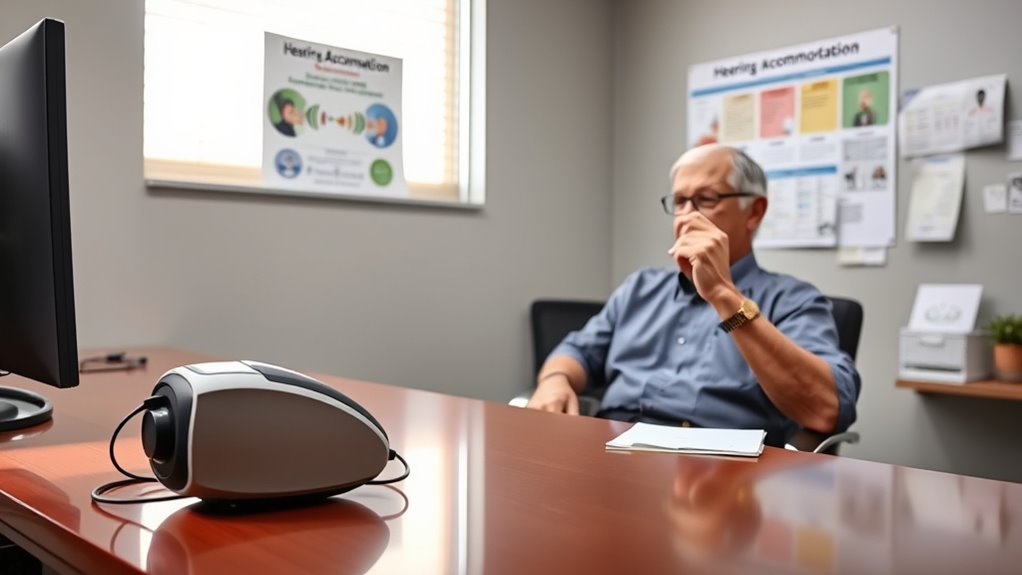VA VR&E programs offer essential hearing accommodations to help you succeed in work and education. You can access assistive listening devices like hearing aids, FM systems, and amplification tools tailored to your needs. Effective communication strategies—such as positioning, visual cues, and note-taking—are encouraged. Working closely with your VA counselor and specialists guarantees your accommodations are customized and updated over time. Continue exploring to discover how these supports can empower your journey.
Key Takeaways
- VA VR&E offers personalized hearing accommodations, including assistive listening devices, to support employment success.
- Collaboration with VA counselors and audiologists ensures suitable hearing aids and communication strategies are implemented.
- Training on device use and communication techniques helps veterans maximize their hearing accommodations.
- Ongoing support and regular assessments allow for adjustments to accommodations as needs evolve.
- Effective communication and proactive advocacy are encouraged to improve hearing-related participation during rehabilitation.

If you’re receiving VA vocational rehabilitation services and have hearing difficulties, accommodations can make a significant difference in your success. One of the most effective ways to support your communication needs is through assistive listening devices and tailored communication strategies. These tools and techniques help you stay engaged, understand instructions clearly, and participate fully in your training or work environment. When you work with your VA counselor, they can help identify the best assistive listening options for your specific situation, whether it’s hearing aids, FM systems, or other amplification devices. These devices can reduce background noise and improve speech clarity, making it easier to follow conversations and instructions during your rehabilitation process.
Implementing communication strategies is equally important. You might learn to position yourself to face speakers directly, ensuring you see their facial expressions and lip movements, which can enhance understanding. Using visual cues or written materials alongside verbal instructions can also reinforce communication and minimize misunderstandings. Your VA counselor may suggest techniques like note-taking or requesting that colleagues speak slowly and clearly. These strategies empower you to take control of your communication and ensure you don’t miss critical information during training or employment tasks.
Position yourself to see speakers’ faces and use visual cues to improve understanding.
Additionally, your rehabilitation plan can incorporate training sessions to improve your communication skills with assistive listening devices and strategies. You might practice using equipment in real-world scenarios or learn how to advocate for your needs in various settings. This proactive approach helps build confidence and independence, so you’re prepared to manage your hearing challenges effectively. Incorporating professional training and resources can further enhance your ability to utilize these accommodations successfully.
It’s essential to communicate openly with your VA rehabilitation team about your hearing difficulties and the accommodations that work best for you. They can coordinate with audiologists or hearing specialists to ensure you receive the proper devices and support. Regular check-ins can help assess whether your assistive listening devices are functioning correctly and if your communication strategies are effective. Adjustments can be made as needed, ensuring your accommodations evolve with your progress.
Top picks for "vocational rehabilitation hear"
Open Amazon search results for this keyword.
As an affiliate, we earn on qualifying purchases.
Frequently Asked Questions
How Do I Qualify for Vr&E Services With Hearing Impairments?
You qualify for VR&E services with hearing impairments if your condition affects your ability to find or keep employment opportunities. You need to have a service-connected hearing loss or related disability. Once eligible, you can access support services like career counseling, training, and accommodations tailored to your needs. These services help you overcome barriers, improve your skills, and enhance your chances of securing meaningful employment.
What Specific Hearing Accommodations Are Available Through Vr&E?
You can access hearing accommodations like assistive technology, such as hearing aids or FM systems, and workplace modifications to improve communication and comfort. VR&E services often provide specialized equipment and adjustments, like amplified phones or visual alert systems, tailored to your needs. These accommodations help you succeed in your training or employment, ensuring your hearing impairment doesn’t hinder your progress. Discuss your specific needs with your VR&E counselor to customize your support plan.
Can Vr&E Assist With Hearing Aids or Assistive Listening Devices?
Yes, VR&E can help you get hearing aids and assistive listening devices, making life-changing differences! They often provide hearing aid funding and support for assistive listening devices, ensuring you’re equipped with excellent technology. Imagine hearing every word clearly and engaging fully in conversations. VR&E’s goal is to empower you with the tools needed to thrive, so don’t hesitate to ask about these essential hearing accommodations today!
How Long Does the Vr&E Hearing Accommodation Process Typically Take?
The hearing accommodation process usually takes a few weeks to a few months, but timing expectations can vary. You might experience process delays due to paperwork or scheduling issues, so stay in regular contact with your provider. To guarantee smooth progress, respond promptly to any requests and keep track of your appointments. Knowing that delays can happen helps you stay patient and proactive throughout the process.
Are Hearing Accommodations Covered Under Va’s Vocational Rehabilitation Benefits?
Think of hearing accommodations as the bridge that helps you cross employment hurdles smoothly. Yes, VA’s vocational rehab benefits often cover hearing accommodations, including assistive devices and support services. This assistance enhances your employment support options, helping you succeed in the workplace. Additionally, if you require service animals, those costs may also be covered, ensuring you get the full support you need to thrive professionally.
Conclusion
Charting VA Vocational Rehabilitation and hearing accommodations can feel like steering a course through uncharted waters. But with the right support and accommodations, you can sail smoothly toward your career goals. Remember, you’re not alone on this journey—resources are there to help you find your voice and turn obstacles into stepping stones. Embrace the tools available, and watch how your path brightens like a lighthouse guiding you home.










